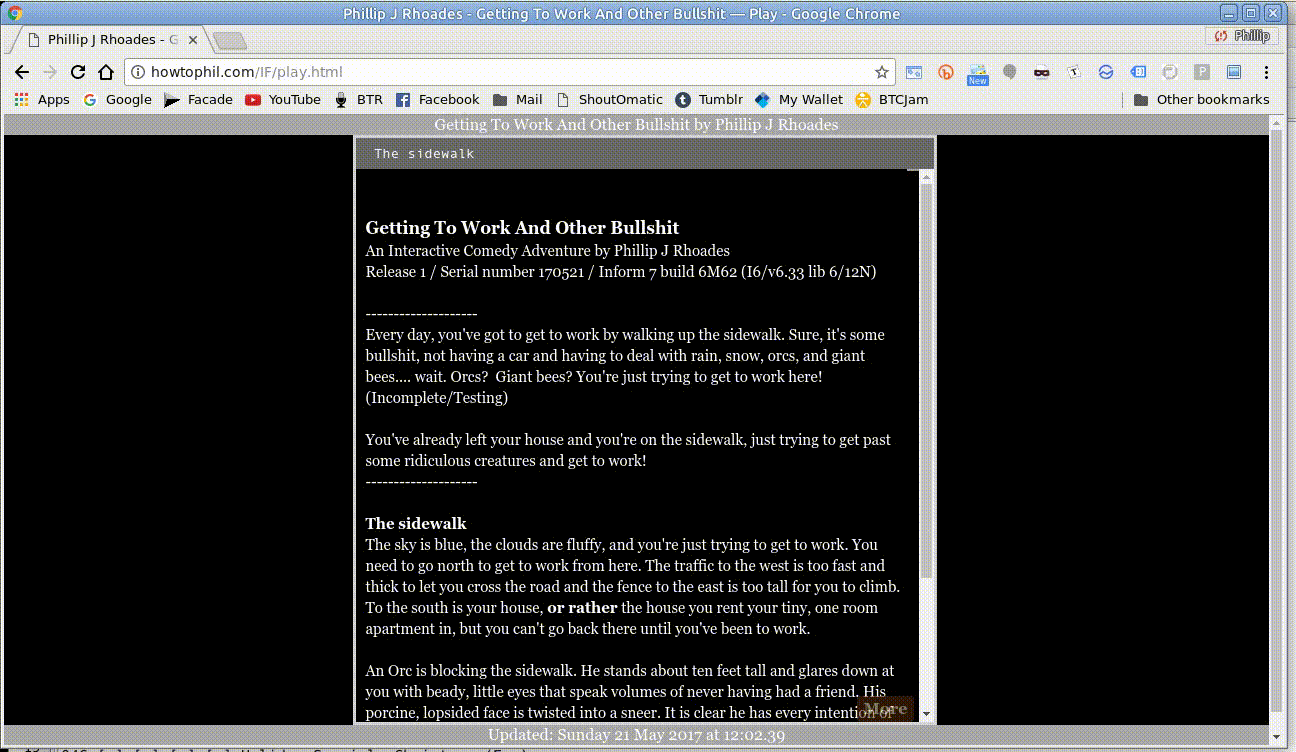Hey there,
I’ve started working out the process for binding existing tools together to let people play automagically translated IF games. I use dumbfrotz which is great for piping input and output to github.com/DavidGriffith/frotz/blob/master/DUMB
I also use trans, a command line tool for linux that uses Google Translate (or bing or whatever) to translate between languages. ostechnix.com/use-google-tr … ine-linux/
Once I have them both in place I can issue a command like this:
# ./dumbfrotz ./Advent.z5 |./trans :fr -bWhich starts outputting the text like this:
[code]Bienvenue dans Adventure!
(Tapez HELP pour obtenir des instructions et des informations.)
.
AVENTURE
The Interactive Original
Par Will Crowther (1976) et Don Woods (1977)
Reconstruit en trois étapes par:
Did you mean: Donald Ekman, David M. Padgett (1993) and Graham Nelson (1994)
Donald Ekman, David M. Baggett (1993) et Graham Nelson (1994)
[In memoriam Stephen Bishop (1820? -1857): GN]
Sortie 9 / Numéro de série 060321 / Informer v6.30 Bibliothèque 6/11 S
À la fin de la route
Vous êtes debout au bout d’une route avant un petit bâtiment en brique. Autour
vous êtes une forêt. Un petit ruisseau sort du bâtiment et descend un ravin.
look
*** PLUS *** At End Of Road Score: 36 Départs: 0
.
get allAt End Of Road Score: 36 Départs: 1
.
Forêt: C’est à peine portable.
Route: C’est à peine portable.
Stream: vous n’avez rien à transporter l’eau.
bien maison: c’est à peine portable[/code].
As you can see, you still have to type the commands in english, but I think this could be worked out if I design a user interface in something that lets me pass French/Spanish/Etc to trans, then the generated english to dumbfrotz, then get the english from dumbfrotz and pass that to trans, spitting back out the French/Spanish/Etc again. And, of course, being computer translated introduces all the problems involved with that.
Perhaps in the final UI I should have “Original English” in one pane and “Translation” in another…
Thoughts? Suggestions?
transfrotz.zip (156 KB)

 I started to play with some C++ code in Qt 5.9.1 to hook in your Google Translate and a profanity filter - but right away I found out how complex the bi-dir pipes issue was. I assume you have solved all the pipe issues with your bash trans script. If anyone has two-way interactive pipe C++ code that could run in Qt 5 - please mention. Thank you and great to see stdin/stdout app chaining IF ideas getting attention.
I started to play with some C++ code in Qt 5.9.1 to hook in your Google Translate and a profanity filter - but right away I found out how complex the bi-dir pipes issue was. I assume you have solved all the pipe issues with your bash trans script. If anyone has two-way interactive pipe C++ code that could run in Qt 5 - please mention. Thank you and great to see stdin/stdout app chaining IF ideas getting attention.